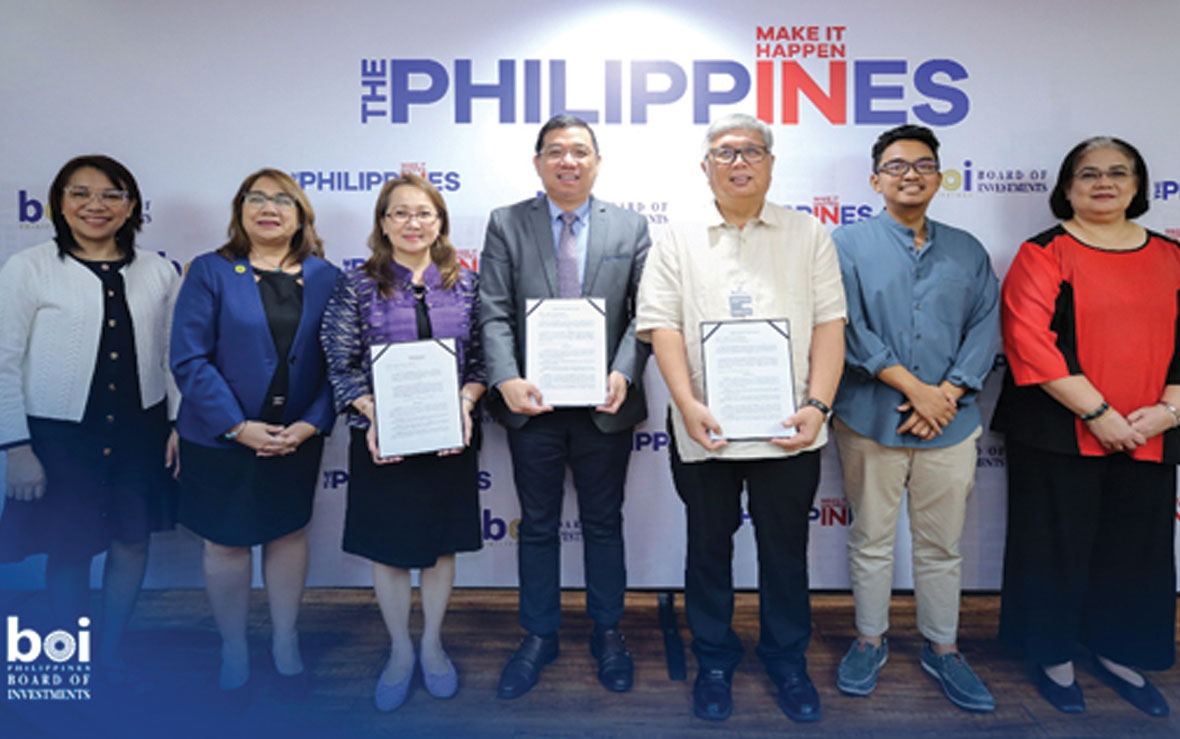MAKATI CITY— In pursuit of food security and health promotion, the Philippine Board of Investments (BOI), University of the Philippines-Manila (UPM), and University of the Philippines-Los Baños (UPLB) have signed Memoranda of Understanding (MOU) to collaborate on investment promotion activities for locally developed biofertilizers and herbal medicine technologies.
Trade Undersecretary and BOI Managing Head Ceferino Rodolfo, along with Industry Development Service (IDS) Executive Director Ma. Corazon Halili-Dichosa, represented the BOI at the signing ceremony. UP Manila was represented by its Vice Chancellor for Research Leslie Michelle Dalmacio and Dr. Lourdes Marie Tejero, Director of the Technology Transfer and Business Development Office (UPM-TTBDO), while UPLB was represented by Vice Chancellor for Administration Prof. Rolando T. Bello and Dr. Emil John Cabrera of the UPLB-TTBDO.
The MOU seeks to accelerate the development of the agri-based biotechnology and herbal medicine industries in the country by providing a platform for technology transfer, investment promotion and facilitation, and collaboration among the parties.
The platform includes the conduct of investment promotion activities such as domestic roadshows and technology matching events to raise awareness of the industry stakeholders on the commercialization-ready biofertilizer and herbal medicine technologies for adoption.
“This MOU will be a strategic tool to pursue all these opportunities through the promotion of the commercialization of the technologies already developed by UP Los Baños and UP Manila for biofertilizer and herbal medicines,” said Undersecretary Rodolfo during the signing ceremony.
The BOI, as the country’s lead industry and investment promotion agency, is partnering with UP Manila and UP Los Baños—each a game-changer in their own right—to actively advance the development of the local agriculture and herbal medicine industries.
“It is high time to put the spotlight on Pinoy-made products and showcase the innate Filipino-vation spirit. As we move forward, I’m confident that our collaboration will yield positive outcomes in terms of investment generation. After all, UP does not only produce great minds but also the best results,” he added.
As part of its efforts to foster the growth of key agribusiness industries, BOI’s Resource-Based Industries Service (RBIS) has launched its 2024-2028 sectoral work plan under its Industry Development Program, which includes measures to support the development of the Philippine biofertilizer and herbal medicine industries.
“We are formalizing our partnership with the signing of this MOU. The document reflects our shared commitment to the triple goal of advancing sustainable agricultural production, enhancing public health, and strengthening the local economy,” UPM Vice Chancellor for Research, Dr. Dalmacio said.
UPM’s Institute of Herbal Medicines, which oversees the National Integrated Research Program on Medicinal Plants, plays a crucial role in ensuring that Filipinos consumers have access to safe, effective, and affordable natural medicines derived from the country’s abundant herbal resources.
On the other hand, UPLB and BOI’s combined efforts will accelerate the production and commercialization of these local technologies that will revolutionize the industry and improve quality of life.
“Today marks a milestone in our ongoing journey towards achieving sustainable development for science and technology and innovation. This MOU marks a new chapter of government-academe collaboration,” UPLB Vice Chancellor for Administration, Dr. Bello said.
UPLB has been a center of excellence for agriculture-related studies and, through its National Institute of Molecular Biology and Biotechnology (BIOTECH), has produced commercially-viable biofertilizer products and technologies. Records from the Fertilizer and Pesticide Authority reveal that it is only UPLB among many the local agricultural academic institutions that have successfully registered some of its biofertilizer products, attesting to the effectiveness and safety of its developed products.
Executive Director Ma. Corazon Halili-Dichosa stated that the first critical step following the MOU signing is to conduct domestic investment roadshows across three strategic regions—Regions 3, 6, and 10—to promote technologies developed by UPM and UPLB that are ready for commercialization.
“Through these roadshows, we hope to increase investments by facilitating market access for Philippine-developed products and technologies. BOI stands ready to provide incentives and pursue collaborative projects favoring the development of local biofertilizer and herbal medicine industries,” Executive Director Halili-Dichosa added.
BOI Director Raquel Echague emphasized that the Technology Transfer and Business Development Offices of UPM and UPLB will play a vital role in promoting the commercialization of their technologies. These TTBDOs are responsible for integrating programs, policies, and activities that protect, promote, and successfully transfer UPLB and UPM technologies by connecting technology developers with private investors and potential users.
“This MOU starts the formal collaboration of the BOI, UP Manila, and UP Los Baños in braving the nation’s pursuit towards food security and health promotion for every Filipino,” Director Echague said.
Biofertilizers and herbal medicines are key industries prioritized in the BOI’s five-year agribusiness plan. The development of biofertilizers aims to strengthen the local agribusiness supply chain and reduce dependence on imports, while the focus on herbal medicines leverages the Philippines’ natural advantage in cultivating herbal crops.
The country is home to approximately 13,500 plant species, with around 3,500 being endemic and 1,500 recognized for their medicinal and therapeutic properties. Of these, 10 have been prioritized under the National Integrated Research Program for Medicinal Plants (NIRPROMP) and the Tuklas Lunas Program.
Developing these two industries is expected to yield significant economic benefits, including job creation and increased value addition. The MOU primarily aims to attract investments in these sectors, which are crucial to their growth and development.








